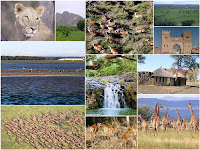Uganda's Energy Crisis
Uganda's oil wealth might later help in solving the country's serious energy shortage; the country is one of the least powered African Nations - with 95% of Ugandans having no access to electricity from the national grid. For now, if Uganda is to continue growing and attracting investors, it needs to very much increase its power supply to satisfy its electricity demands which is estimated to be growing at the rate of 7–8% per annum; and with affordable and regular power supply, that growth will jump up even more :
The problem is: how does Uganda increase that power? Solar power, which is excellent, is too expensive for most Ugandans. Wind power? That too is too expensive for most Ugandans, though also an excellent means of creating energy. Hydro electric power, which Uganda can produce abundantly from its many rivers, can be environmentally rather destructive. Nuclear power? Why not? But, the dangers and the enormous amount of money and care needed to start and maintain nuclear power, makes it the most unlikely source for electricity in Uganda.
Of all these options, as much as I hate it, after weighing the negative and positive aspects of all, and the cost - the best means for the country would be: hydro electric power serving most Ugandans, with a combination of other renewable energy sources such as solar, wind and geothermal power wherever possible.
Geothermal power, which estimates say Uganda can produce up to about 450 MW (compare that to Uganda's present power generating capacity of about 390 MW) - is a very good alternative to hydro electric power. The problem with that: almost all the suitable areas for producing geothermal power are in Western Uganda and the Lake Albert region; the same area where Uganda's oil is. If the greatest care is not taken while exploiting these resources, the Lake Albert region - instead of being a great blessing for the country - can easily be turned in to an environmental disaster zone.
However Uganda increases its power generation and whatever means it uses, as long as the country's breathtaking natural beauty and wildlife - which are the country's greatest and most precious wealth - are made a priority and protected; Uganda will undoubtedly have a most promising future for its people.
Our population is about 30 million so if you divide one figure by the other, you will discover that as a Ugandan you are entitled to 10 Watts of installed capacity in terms of electric power. Is it little or a lot? Gentlemen, it is far too little! An Egyptian has got 250 Watts, a South African 1,100 Watts and a Swede 15,000 Watts. The Monitor
The problem is: how does Uganda increase that power? Solar power, which is excellent, is too expensive for most Ugandans. Wind power? That too is too expensive for most Ugandans, though also an excellent means of creating energy. Hydro electric power, which Uganda can produce abundantly from its many rivers, can be environmentally rather destructive. Nuclear power? Why not? But, the dangers and the enormous amount of money and care needed to start and maintain nuclear power, makes it the most unlikely source for electricity in Uganda.
Of all these options, as much as I hate it, after weighing the negative and positive aspects of all, and the cost - the best means for the country would be: hydro electric power serving most Ugandans, with a combination of other renewable energy sources such as solar, wind and geothermal power wherever possible.
Geothermal power, which estimates say Uganda can produce up to about 450 MW (compare that to Uganda's present power generating capacity of about 390 MW) - is a very good alternative to hydro electric power. The problem with that: almost all the suitable areas for producing geothermal power are in Western Uganda and the Lake Albert region; the same area where Uganda's oil is. If the greatest care is not taken while exploiting these resources, the Lake Albert region - instead of being a great blessing for the country - can easily be turned in to an environmental disaster zone.
However Uganda increases its power generation and whatever means it uses, as long as the country's breathtaking natural beauty and wildlife - which are the country's greatest and most precious wealth - are made a priority and protected; Uganda will undoubtedly have a most promising future for its people.


